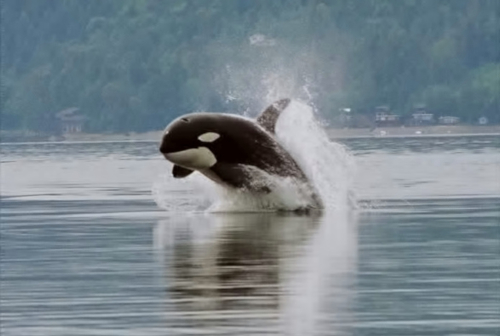SUBSCRIBE TO THE FREE NEWSLETTER
We All Want Marshmallows
New poetry by Adèle Barclay
“…the sky is a black sheep
bleating and I can’t even
see the wolf in the photo
you texted me
but I feel his snarl
in your voice over speaker phone…”
Vancouver BC poet Adèle Barclay’s poem “We All Want Marshmallows,” now online at Cascadia Magazine, is a lovely examination of love and letting yourself go. Set on Galiano Island, the poem is evocative of the influence Pacific Northwest landscapes have on those of us who live there.
Accompanying Barclay’s poem is a painting by Sheila Norgate, an artist based on Garbiola Island, BC who describes herself as a “dog-crazy artist, writer, performer, and pre-post feminist”
Read the full poem online here.
And if you appreciate great writing like this, please consider becoming a supporting reader of Cascadia Magazine. We depend on donations from our readers in order to pay our writers and artists a fair rate for their work. It only takes a few moments to make a contribution at our donate page.
And if you’re already a supporting reader, thank you!
Cascadia Magazine original: Lower South Fork Skokomish Trail
Looking to get out for a hike this weekend? If you live in western Washington, you should definitely check out the Lower South Fork Skokomish River Trail on the Olympic Peninsula. This all-season hike meanders through old growth forest and offers great opportunities to spot elk. Want to find out more? Read Craig Romano’s writeup online here at Cascadia Magazine.
Why are Salish Sea orcas in peril?
At the Seattle Times, environmental reporter Lynda Mapes has a fantastic, detailed feature on why the southern resident pod of orcas that inhabit the Salish Sea in Washington and British Columbia are in steep decline, while pods near the north end of Vancouver Island are thriving. The quick answer? People. Millions of them and the ships, pollution, and declining salmon runs we inflict. The photos by Steve Ringman are magnificent, too. In related news KUOW speaks with Skagit tribes who say the solution to restoring chinook salmon isn’t limiting fishing, but restoring habitat and reducing runoff pollution. And if you haven’t yet read Paul Nelson’s poem Elegy for Tahlequah’s Calf, expressing grief for the dead orca that captured the world’s imagination, you can read it online at Cascadia Magazine.
Portland city council rejects proposal to limit protests
According to OPB, Portland mayor Ted Wheeler’s controversial proposal to strictly limit the size and location of protests failed to pass a vote in the city council. The measure would have given the mayor and police chief sweeping powers to prevent recent clashes between white nationalists and anti-fascists. Meanwhile, many people thought a recent cover illustration at Willamette Week of Portland police chief Danielle Outlaw was a racist caricature. And Seattle’s city council passed a new contract for police officers that has drawn criticism from rights activists who say it waters down reform efforts.
Botched murder case exposes flaws in BC legal system
The Tyee has an investigative report by Paul Willcocks that examines how the botched handling of a 2006 murder case in Port Alberni has exposed deep flaws in BC’s legal system, especially the lack of transparency. In related news, Seattle Weekly has a horrifying story of the right-wing conspiracy fears that provoked the murder of the Goldmark family in Seattle three decades ago.
The eastern Oregon town that’s a drone testing haven
OPB reports on how an airfield in Pendleton, Oregon has become a nationally-recognized site for the testing of drones of all shapes and sizes.
Tacoma’s innovative cultural access program
The Stranger reports on the recent passage of Tacoma Creates, making it the first city in Washington to pass a cultural access fund that will provide “programs for youth, neighborhood events, and community activities” reduction in ticket prices for arts events, and improved cultural facilities. In other arts news, the Edward Hopper painting “Chop Suey,” which was promised to the Seattle Art Museum, was instead sold at auction for $91.9 million.
“The Ghost Cabin,” art/fiction by Greg Lundgren
Over at the Fall 2018 issue of Arcade, you can read the slightly surreal story “The Ghost Cabin,” by Greg Lundgren, which was written to accompany an art installation by created by SHED Architecture and Plumb Level Square.
“There are a few things that all ghosts have in common:
1. Ghosts eat pigeons.
2. Ghosts don’t like elevators.
3. Ghosts are extremely patient.”
You can visit the installation at Chophouse Row on Seattle’s Capitol Hill. Read the full story here.
That’s today selection of links to news, environmental coverage, and arts from across the Cascadia bioregion. Have a great evening! –Andrew Engelson
Photo credit: orca whale by Minette Layne, CC BY-SA 2.0

